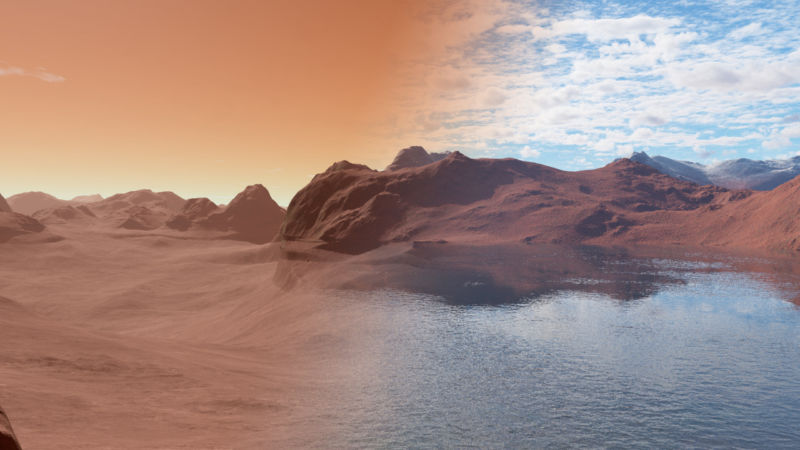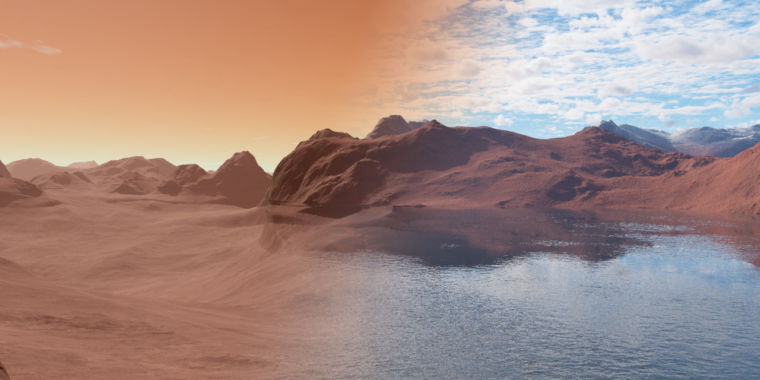
Jon Wade and James Moore
Part of our fascination with chilly-and-dry Mars is its heat-and-moist past. What was Mars admire when it had liquid water? Did any life swim in it? And the set aside did the water plug?
Basically the most obtrusive motive on the serve of that final request is that Mars’ water slowly diffused into outer space. Because Mars is considerably smaller than the Earth, its inner cooled out of the ordinary extra rapid. When the Crimson Planet’s magnetic field petered out spherical Four billion years ago, the loss of this ambiance-holding defend would have allowed water vapor to interrupt out.
But that’s no longer necessarily your entire story. Estimates of Mars’ preliminary store of water tend to be elevated than estimates of how out of the ordinary would have escaped to space on this style. What didn’t plug up can have gone down—below the Martian surface.
Mars has water ice in its polar caps, and it can have layers of ice appropriate below the skin in some areas. But it’s Mars’ bedrock that a community of researchers led by the College of Oxford’s Jon Wade purchased to obsessed with.
On Earth, rocks elevate some surface water downward, largely as a consequence of plate tectonics. But that water lastly comes serve up. That’s on fable of rising temperature and stress at elevated depths begin water from its mineral bonds, the set aside it can role off the manufacturing of magma that carries it up in direction of volcanic exit capabilities. On this style, water customarily avoids diving too deeply into the confines of Earth’s inner.
Mars potentially cooled too rapid to fabricate out of the ordinary in the manner of plate tectonics, however that’s no longer the handiest incompatibility that’s crucial right here. Better oxygen availability during the formation of Mars is guilty for Martian basalt (lava flows) having moderately assorted iron chemistry from its terrestrial counterpart. Couple that with the truth that temperature will increase extra slowly with depth, and Mars’ rocks can have a truly assorted interplay with water.
When Earth’s basalts incorporate water into their minerals, the density decreases, and these moderately “buoyant” rocks aren’t inclined to sink too deep. However the chemistry incompatibility in Martian basalts largely negates the buoyancy perform even because it permits them to soak up extra water. And the various geothermal gradient finally permits water to study up with minerals at deeper depths.
So the researchers remark in regards to the system enjoying out admire this: Martian lavas build layers of basalt that incorporate surface water over time. The eruption of extra layers of lava on top step by step bury older layers and push them down deeper and deeper. When the layers fall some distance sufficient, the temperature lastly reaches the melting point for one of the most indispensable minerals in the rock. But after these minerals begin to melt and spoil away the accumulated-real rock, one of the most indispensable water finally ends up in the accumulated-real share—which occurs to turn into extra dense in the system. At that time, the water is effectively caught in the Martian mantle.
Modeling this task presentations that a minimum of twice as out of the ordinary of Mars’ mantle might perhaps maybe well now luxuriate in water, when put next to the Earth. So it will maybe perhaps well be that the water that didn’t spoil out to space was as a replacement captured by the purple planet’s mantle.
This illustrates how somewhat minor differences—a smaller planet that cools quicker and starts with a shrimp bit extra oxygen in its elemental mix—can have wide penalties for a planet’s evolution. Earth’s geology saved its water conclude to the skin, whereas Mars seemingly pulled it downwards and locked it away. In the present day time, one planet is blue and the opposite is purple.
Nature, 2017. DOI: 10.1038/nature25031, 10.1038/d41586-017-08670-y (About DOIs).


Commentaires récents